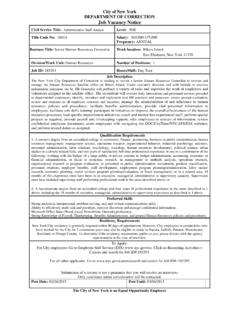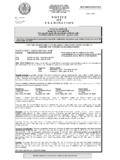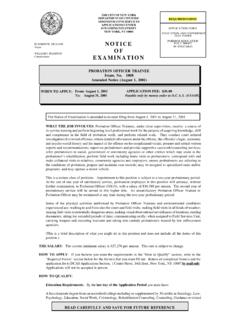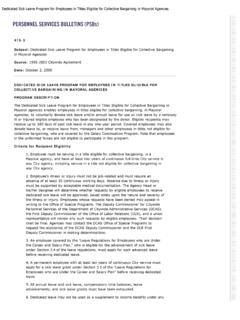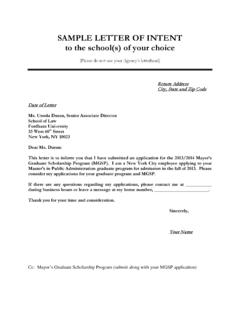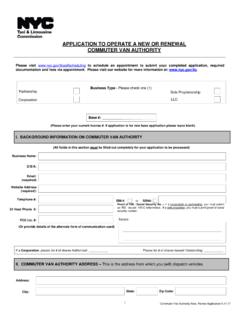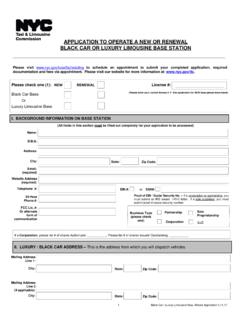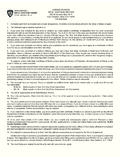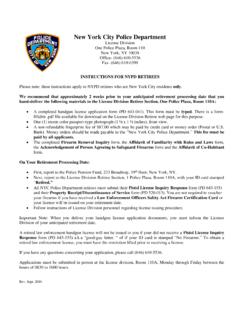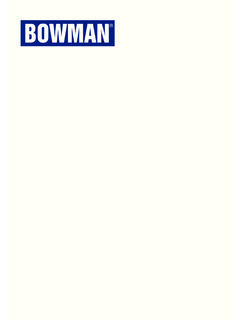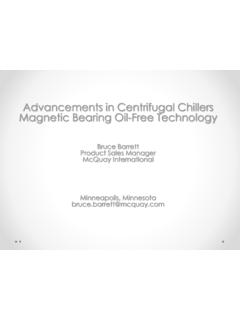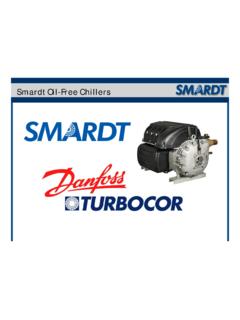Transcription of Department of Environmental Protection - City of …
1 1 Department of Environmental Protection Promulgation of Amendments to Chapter 2 of Title 15 of the Rules of the City of New York Rules Governing the Emissions from the Use of #4 and #6 Fuel Oil in heat and Hot Water Boilers and Burners NOTICE IS HEREBY GIVEN PURSUANT TO THE AUTHORITY VESTED IN THE Commissioner of Environmental Protection by Sections 1043 and 1403 (c) of the Charter of the City of New York, and Sections 24-104, 24-125, and 24-128 of the Administrative Code of the City of New York, and in accordance with the requirements of Section 1043 of the Charter of the City of New York, that the Department of Environmental Protection promulgates a rule governing the emissions from the use of #4 and #6 fuel oil in heat and hot water boilers and burners. These amendments were proposed and published on January 27th, 2011 in the City Record. The required hearing was held on February 28th, 2011.
2 Proposed Rule Amendment Pursuant to the authority vested in the Commissioner of Environmental Protection by Section 1043 and 1403(c) of the Charter of the City of New York and Sections 24-105, 24-125, and 24-128 of the Administrative Code, the Department of Environmental Protection promulgates rules regarding emissions from the use of #4 and #6 fuel oil in heat and hot water boilers and burners. The proposed rules were not listed in the Department s fiscal year 2010 Regulatory Agenda. Please note that the proposed rules are new and therefore the text is underlined. Statement of Basis and Purpose Statutory Authority Section 24-102 of the Administrative Code of the City of New York declares that it is the public policy of the City to preserve, protect, and improve the air resources of the City because every person is entitled to air that is not detrimental to life, health, and enjoyment of property.
3 Specifically, the section declares that the emission into the open air of harmful or objectionable substances, including substances resulting from the use of fuel burning equipment, is a menace to the health, welfare, and comfort of the people of the City and a cause of extensive damage to property and that it is the public policy to actively regulate and reduce such emissions. Section 1403(c) of the Charter of the City of New York and Section 24-105 of the Administrative Code authorize the Commissioner to regulate and control the emission of harmful air pollutants into the open air. Additionally, the Administrative Code provides that the issuance of Work Permits and Certificates of Operation are contingent upon the use of equipment, and by extension fuel, 2 that will satisfy the Commissioner as to their emission of contaminants. Section 24-125(b) of the Administrative Code states that in order to reduce the emission of air contaminants and to insure optimum combustion in fuel burning equipment, the Commissioner will not issue a Work Permit unless the equipment is shown to the satisfaction of the Commissioner to burn appropriate fuel.
4 Similarly, section 24-128 of the Administrative Code provides that the Commissioner will not grant a Certificate of Operation unless the Commissioner is satisfied that the equipment satisfies the standards of section 24-125 and, if the equipment uses residual fuel oil, that it uses emissions controlling devices as determined by the Commissioner. Summary of Provisions In order to improve the air quality of the City, the Department of Environmental Protection is amending Chapter 2 of Title 15 of the Rules of the City of New York to prohibit the use of fuel oil grade numbers 4 and 6 in heat and hot water boilers and burners, unless it can be demonstrated that the emissions of Particulate Matter (PM) and Oxides of Nitrogen (NOx) are equivalent to or cleaner than set fuel types. The rule: For owners with an existing Work Permit, requires boilers to use fuel oil grade #2, #4 and/or natural gas in order for applicants to receive a renewed Certificate of Operation.
5 Boilers that use fuel oil grade #6 will not receive a renewed Certificate of Operation unless the applicant demonstrates that the fuel oil grade #6 that will be used will emit the same or less PM and NOx than fuel oil grade #4 on an annual basis. As of January 1, 2030, requires boilers to use fuel oil grade #2 and/or natural gas in order for applicants to receive a new or renewed Certificate of Operation, unless the applicant demonstrates that the fuel oil grade #4 and/or #6 to be used will emit no more PM and NOx than fuel oil grade #2 on an annual basis. This schedule will provide owners with time to convert to fuel oil grade #2, or its equivalent, or natural gas, while ensuring more rapid transition from the most polluting fuel oil. Alternatively, an owner of a great number of buildings with boilers that must be converted or replaced to use cleaner fuels may apply to the Commissioner of Environmental Protection to enter into an agreement with a timeline for compliance with the rule.
6 This provision recognizes that there are additional costs associated with the conversion or replacement of a large number of boilers, that there are a limited number of licensed installers and scheduling constraints may arise when an owner has to convert or replace a great number of boilers, and that it may be possible for such owners to progress directly to the use of cleaner fuels, #2 fuel oil or natural gas, at an earlier date than would otherwise be required. Similarly, an owner of fewer buildings with boilers that must be converted or replaced may apply to the Commissioner of Environmental Protection to enter into an agreement with a timeline for compliance with the requirement to convert or replace boilers that use #6 fuel oil or to demonstrate equivalence to #4 fuel oil. This provision recognizes that in certain cases owners may incur higher than expected costs, and that it 3 may be possible for such owners to progress directly to the use of cleaner fuels, #2 fuel oil or natural gas, at an earlier date than would otherwise be required.
7 For new installations, applications for a Work Permit must specify that the equipment uses fuel oil grade #2 and/or natural gas, unless the applicant demonstrates that the fuel oil grade #4 and/or #6 to be used will emit no more PM and NOx than fuel oil grade #2 on an annual basis. Prevents an owner of a currently-installed boiler and/or burner, who holds a Certificate of Operation, from filing a new application for functional equipment that remains at the premises. This provision codifies an existing policy. This restriction prevents an owner from inappropriately pursuing tax benefits through obtaining a new Certificate of Operation or Work Permit for existing equipment. Shall" and "must" denote mandatory requirements and may be used interchangeably in the rules of this Department , unless otherwise specified or unless the context clearly indicates otherwise.
8 Statement of Purpose The emission of Particulate Matter is associated with negative health impacts, including decreased lung function, aggravated asthma, respiratory symptoms and premature death. See United States Environmental Protection Agency, Health and Environmental Effects on Particulate Matter, Fact Sheet, July 17, 1997. Oxides of Nitrogen create ozone and smog, which reduces lung function and induces respiratory inflammation. See New York City Department of Health and Mental Hygiene, Asthma Facts, 2d ed., May 2003. The following table shows the level of PM and NOx produced from natural gas and fuel oil grade #2, #4, and #6. The figures in the table have been derived from the Office of Air Quality Planning and Standards, United States Environmental Protection Agency, AP-42, Compilation of Air Pollutant Emission Factors, Volume I: Stationary Point and Area Sources (5th ed.)
9 1995), using the latest emission factors published by the Environmental Protection Agency in supplements to that volume the May 2010 supplement for fuel oil and July 1998 supplement for natural gas. NOx ( ) PM ( *) Natural Gas #2 Oil #4 Oil #6 Oil *A standard unit of measurement that provides a basis for comparing the energy content of various grades of natural gas and other fuels. It represents one million British Thermal Units. The table shows that the emissions levels from the use of cleaner burning fuels, such as #2 fuel oil and/or natural gas, are significantly lower than the emission levels from the use of #4 and #6 fuel oil, unless there are emission controls or changes made to the fuel. The New York City Community Air Survey found higher levels of air pollutants such as PM, NOx, and nickel in 4 neighborhoods with many boilers that use #4 and #6 fuel oil.
10 In neighborhoods with high densities of boilers that use #4 and #6 fuel oil, the survey found and 4 times the concentrations of nickel in fine particles as compared to neighborhoods with a low density of such boilers. See New York City Department of Health and Mental Hygiene New York City Community Air Survey: Results from Winter Monitoring 2008-2009 , December 2009. Degradation of air quality due to emissions from boilers using #4 and #6 fuel oil is especially great in densely populated neighborhoods where such boilers are the most prevalent. These rules therefore will decrease the levels of harmful pollutants emitted into the air and inhaled by many people. * * * * * * * * * * * * * * * * * * * * * * * * * * * * * Section 1. Section 2-02 of Chapter 2 of Title 15 of the Rules of the City of New York is amended by adding the following definitions in alpha-numeric order: #2 Oil.
